Spice It Up! The Health Benefits of Everyday Aromatic Cooking Spices
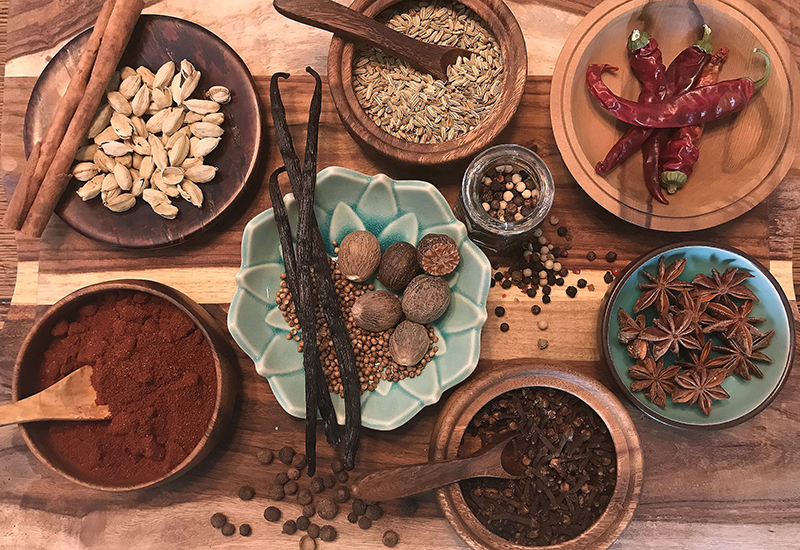
Heinen’s Wellness Consultant, Andrea, offers insight into the health benefits of everyday kitchen spices.
Who doesn’t love the comforting smell of warm, pungent cinnamon filling a room in the winter, or the rich, full flavor of pure bourbon vanilla in baked goods?
Aromatic dried spices can be found in most kitchen cupboards and are used to add depth, aroma and flavor to food, but did you ever stop to think their inherent health benefits? The grocery spice aisle abounds with an incredibly diverse offering of spices carefully selected and gathered from around the world, and the truth is that they have far more value than just arousing your taste buds.
The Ancient Spice Trade Routes
Spices such as cinnamon, cardamom, ginger, cassia, black pepper, cloves, nutmeg and turmeric were important commodities during the evolution of trade over many centuries, and directly influenced the development of the ancient Spice Trade routes. Historically, these spices were so valuable that they were used as currency, only to the rich upper classes. We are so fortunate to have such ease of access and abundance of offerings available to us today.
The Health Benefits of Spices
Throughout history, spices have been used for many reasons. First, they were readily available and found naturally growing in the regions where they were utilized. Yes, they added flavor to food, but were also found to have warming and cooling effects on the body, properties for naturally preserving food and high nutritional value and potent natural compounds.
Many spices are the actual seed of the plant, which is the powerhouse where nature concentrates and stores the life force of the next-generation. This is where spices get their nutritional value.
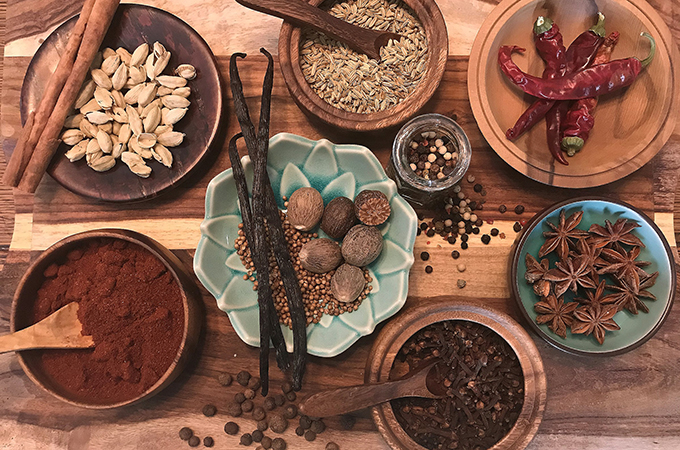
If you are trying to boost your overall wellness with a healthier diet, using spices moderately is a great way to add additional benefits to healthy meals. Most cultures that are linked to strong health and longevity have used spices and herbs heavily for centuries. East India, which uses spices therapeutically in Ayurvedic Medicine, and the diets of the Mediterranean regions are some examples.
The Many Benefits of Common Cooking Spices
- High in antioxidants, vitamins, minerals and polyphenols
- Supports digestive function, soothe indigestion
- Supports proper metabolism and weight
- Supports healthy circulation
- Supports healthy inflammatory response
- Supports relaxation and sleep
- Supports healthy aging
- Supports energy levels
- Creates cleansing effect on the liver and body as a whole
- Creates a warming effect on the body (for winter)
- Creates a cooling effect on the body (for summer)
- Contains anti-viral, anti-bacterial, anti-fungal properties
The Health Benefits of 16 Common Cooking Spices
- Allspice Berry: Supports digestion, healthy circulation, heart health and dental health; boosts immunity; offers anti-inflammatory properties.
- Cardamom: Sweet and spicy in flavor; high in antioxidants; supports healthy digestion; soothes heartburn; contains diuretic, anti-inflammatory and antibacterial properties; creates warming and cooling effects on the body.
- Coriander: High in antioxidants; boosts immune system; stimulates digestive enzymes; supports liver function; helps to alleviate indigestion; stabilizes blood sugar.
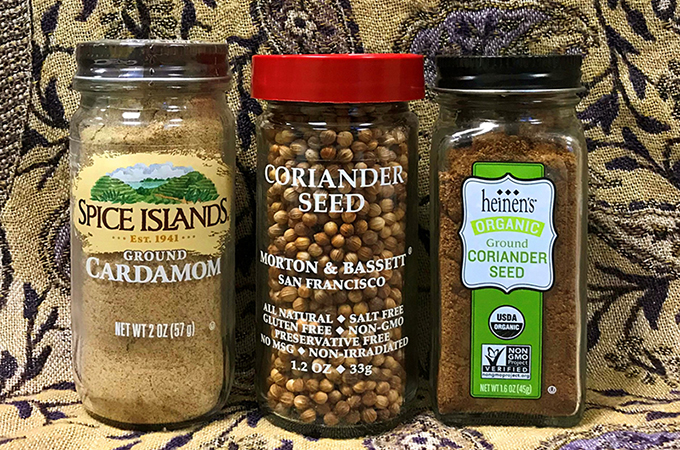
- Cayenne Pepper: High in vitamins A, C and E; contains capsaicin; reduces appetite; increases metabolism and fat burning; helps relieve congestion; support healthy circulation; contains anti-inflammatory properties; helps the body to cleanse.
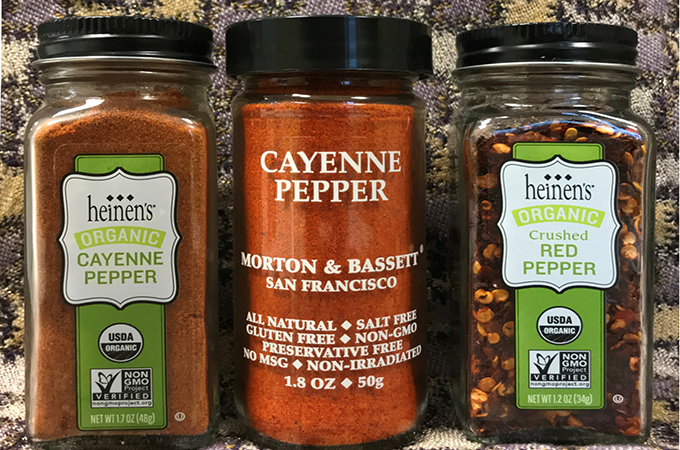
- Cumin: Offers antibacterial, antiviral and diuretic properties; stimulates digestive fire; helps soothe mucus membranes and relieve congestion; supports respiratory system; supports healthy blood sugar; boosts immunity; promotes good sleep.
- Cinnamon: Can be used as a subtle sweetener due to its sweet undertone; high in antioxidants; contains anti-inflammatory and antiseptic properties; supports stable blood sugar; boosts metabolism; helps with tummy bloat; creates warming and cooling effects on the body.
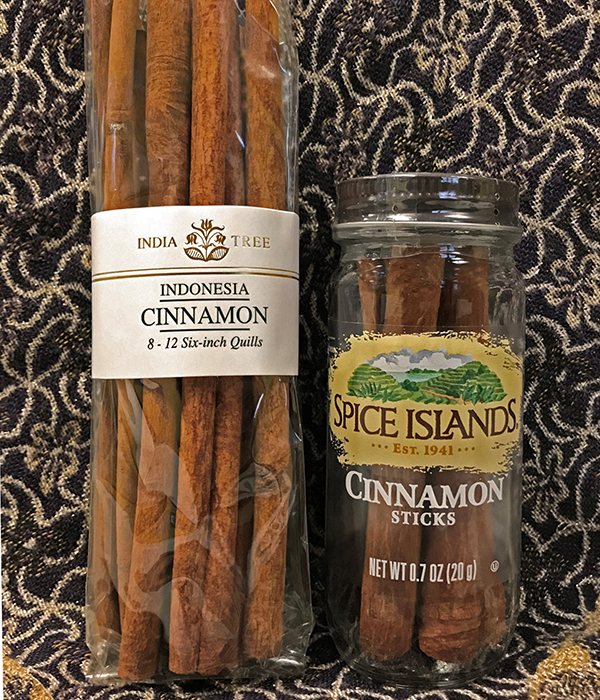
- Fennel Seeds: Mild licorice-like flavor; improves gut health; high in manganese, polyphenol antioxidants and other nutrients; promotes healthy inflammatory response; moves lymph; offers antibacterial effects; supports bone health; contains limonene, which helps to combat free-radicals.
- Cloves: Versatile for meats and baked goods; contains antibacterial, anti-fungal, antiviral and antiseptic properties; a rich source of antioxidants, minerals and omega-3 fatty acids; helps with indigestion and nausea.
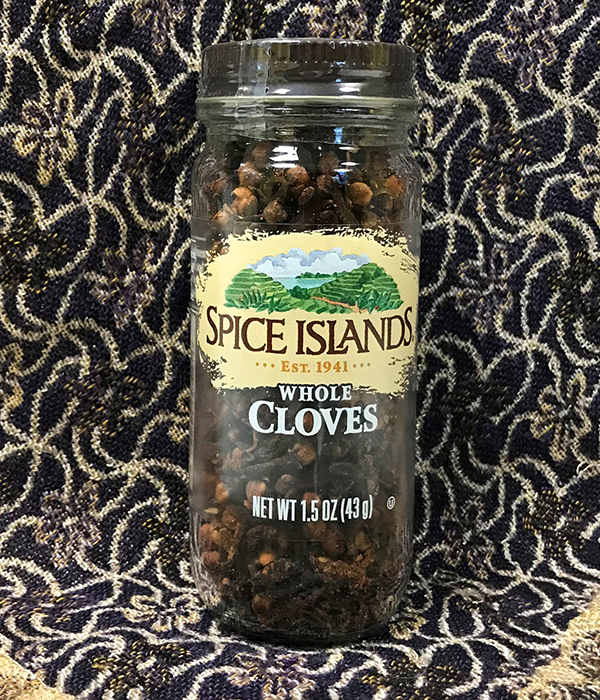
- Juniper Berries: Very high in antioxidants; supports detoxification of the body; promotes healthy digestion and skin; supports the stomach, kidneys and urinary tract.
- Nutmeg: Supports the stomach and digestion; antibacterial; rich in anti-inflammatory compounds; contains detoxification properties; supports sleep; known to improve the texture of skin skin.
- Star Anise: A small start-shaped seed that comes from an evergreen shrub; good for meats and baking; promotes healthy digestion and aging; contains antimicrobial, anti-fungal and diuretic properties; a rich source of two antioxidants that protect the body against cellular damage caused by environmental toxins; high in vitamins A and C; improves elimination.
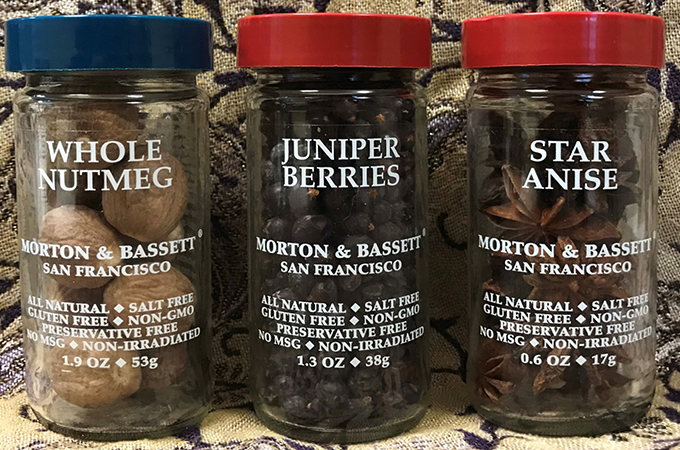
- Mustard Seeds: Native to the Mediterranean region; high in antioxidants and omega-3 fatty acids; contains high levels of calcium, magnesium, manganese, zinc, and selenium to promote bone health; supports healthy circulation and heart health; supports healthy blood sugar.
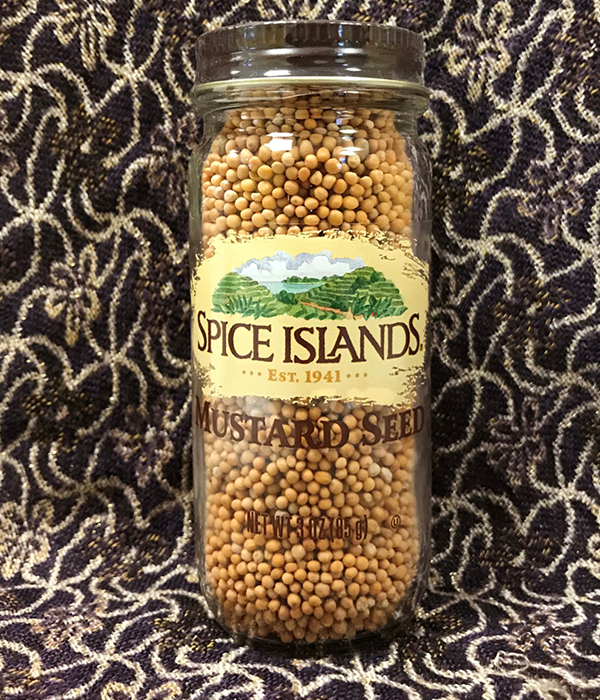
- Paprika: A relative of red pepper; high in antioxidants; 1 tsp. has 37% of the RDA of Vitamin A; contains enzymes that stimulate brain activity and induce sleep.
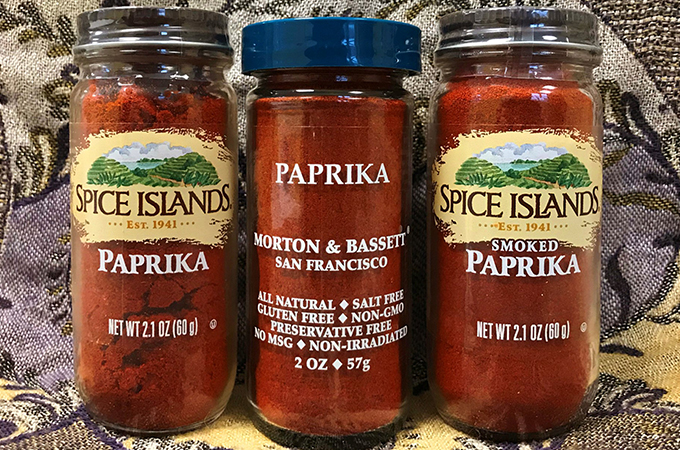
- Black Peppercorns: Simulates digestion and food absorption; helps protect against free radicals; alleviates congestion; aids in weight loss and blood sugar control.
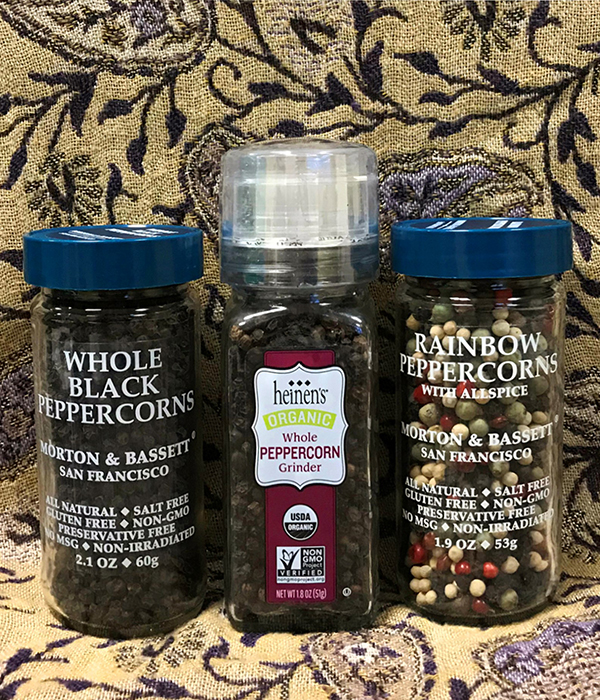
- Sesame Seeds (white and black): A tiny seed with a nutty taste; boosts nutrition absorption; contains cholesterol-lowering compounds; black sesame seeds are high in iron and vitamin B; black and white sesame are very high in calcium and minerals.
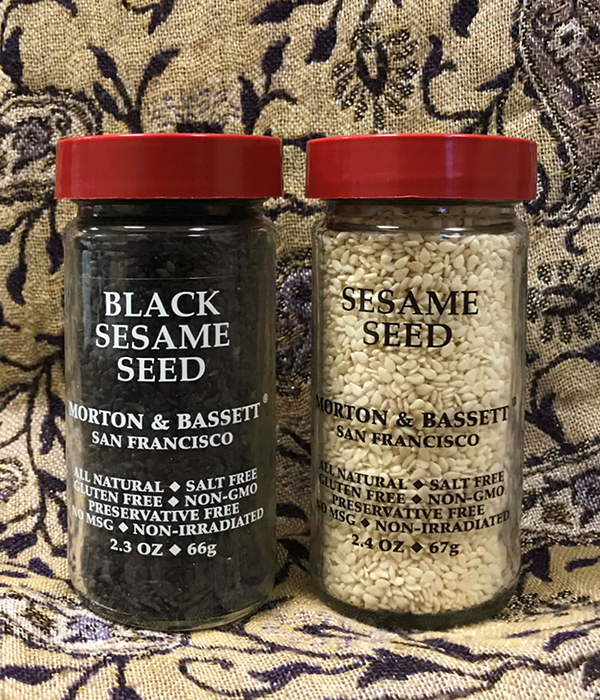
- Vanilla Bean: A bean pod harvested from a tropical orchid; available in a paste, extract or dried bean pod; has a sweet aroma that can promote a sense of peace and calm; commonly used in baking; calms the stomach and promotes digestion; high in antioxidants; contains antibacterial and anti-inflammatory properties; boosts immune system; protects the body’s tissues from free-radical damage.
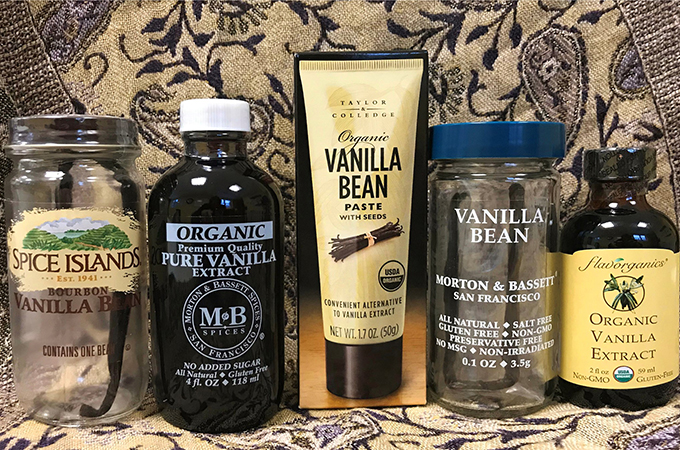
How to Bloom Spices in Oil
When cooking, you can enhance the flavor of spices by blooming them in oil. Seeing as most flavor compounds are fat soluble, blooming, a South Asian cooking technique, helps to bring complex aromas to their fullest expression.
Simply heat 2 Tbsp. of oil ( ghee, coconut, avocado, olive, etc.) over medium-low heat and add whole or ground spices of your choice. Ground spices can burn quickly, so be aware. You can also add garlic, citrus peel, rosemary, thyme or chiles and bay leaves. Cook lightly a few minutes until the spices start to release their aromas. Be careful not to overcook.
Pour the bloomed spices over roasted veggies, lentils, beans, yogurt or hummus, or use them as the base of a homemade vinaigrette.
How to Brew Tea with Aromatic Spices
Spices can also be used to brew homemade tea. Start by placing 1-3 of your favorite spices in 16 oz. of water. The ratio of spices is approximately 1 tsp. whole spice : 3/4 tsp. ground spice. Use your own preference for strength of flavor. Some spices are milder than others.
Simmer for 10 minutes, remove from the heat, cover with a lid and steep for 3 minutes. Strain the spices and add orange zest, fresh-grated ginger root, 1 tsp. vanilla extract and a small amount of honey or manuka honey. Drink warm.
Note: If you’re looking to fight cold and flu season or promote weight loss, try a traditional East Indian tea made from 7 whole star anise pods and a 2” piece of whole cinnamon in 2 cups water. Follow instructions above.
The Best Ayurvedic Tea for Enhancing Digestions
This tea has a long history of use in Ayurveda and is known to soothe and calm the digestive system and mind. It aids in the absorption of nutrients and stimulates the lymphatic system.
Ingredients
- 1/2 tsp. fennel seeds
- 1/2 tsp. cumin seeds
- 1/2 tsp. coriander seeds
- 2-3 cups purified or spring water
Instructions
- Bring water to a boil and remove from the heat.
- Add the spices to the water and let simmer for 5-10 minutes. Allow to steep for an additional 15 minutes.
- Strain out the seeds and place in an insulated thermos. Drink 1/2 to 1 cup tea before a meal. You can also drink it after meals.
Note: The purpose of this tea is to increase blood circulation to the digestive system. This tea should be consumed hot as heat opens blood vessels. Make fresh daily for best results.
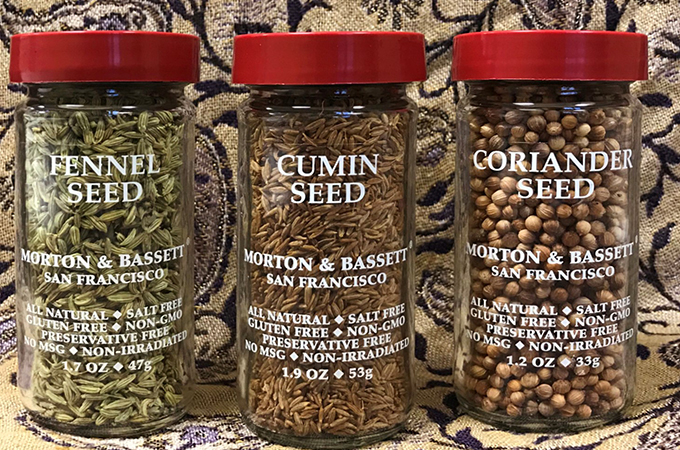
Best Practices for Purchasing Spices
Regardless of the spices you choose, it’s important select a high quality to ensure the freshest and most potent product. As a rule of thumb, always purchase spices with an expiration and opt for organic when possible.
Ground spices tend to lose their strength faster than whole spices. Spices tend to have their freshest and most intense flavor right after grinding, so keeping whole spices in the cupboard and grinding as you need in small quantities can bring more depth of flavor to your dishes. Grind the seed spices in a spice grinder or coffee bean mill. Store all spices in airtight containers away from heat, moisture and direct sunlight. Most whole spices can last anywhere from 2-5 years.
We do our best at Heinen’s to source reliable brand name spices. Let us help you explore the riches of our spice aisle and find the best ones for you!
Disclaimer: Please be advised that this information in intended for educational use only. Before incorporating the moderate use of spices into your daily heath regimen, consult with a medical professional to be sure they do not interfere with any current treatment or medications. Also, consult your physician if you are pregnant, lactating or have an autoimmune disorder.


